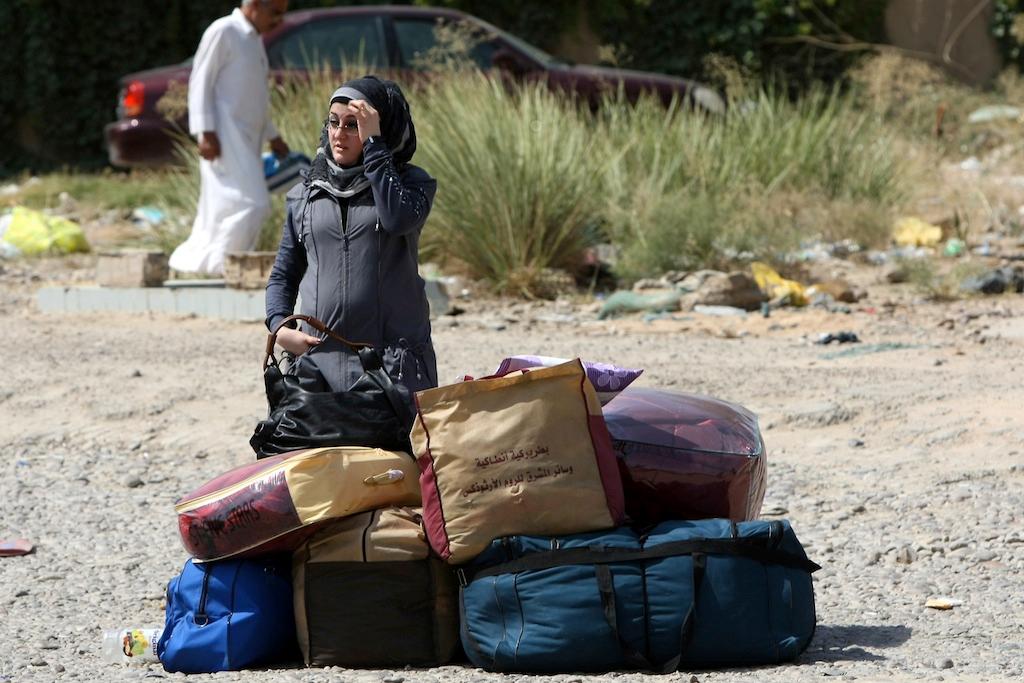Iraqi refugees in America: Finding a new home
An Iraqi refugee, who had fled to Syria following the 2003 US-led invasion of Iraq, waits next to her belongings upon her arrival in Baghdad on July 3, 2011.
BOSTON — When a rock with a death threat wrapped around it was thrown into her house in Baghdad, Saba Al Khadady, 31, and her family knew is was time to leave Iraq.
The threat, which said “either you leave or will die,” prompted Al Khadady and her family to pack their bags and head to Syria.
Their journey, which began in August 2004, is representative of the journey made by countless Iraqi refugees, who have fled Iraq following the invasion by American and British troops.
Now, after the official end to the war on December 15, the International Rescue Committee states 3 million Iraqis are displaced “and tens of thousands of others in danger because they worked for the U.S. military.”
In the years following the March 2003 invasion, crime against religious and ethnic minorities has skyrocketed.
Al Khadady, who is part of the Mandean religious minority, says she believes her religion might have been the cause behind the violence against her family.
She is not alone. Dahlia Wasfi, an Iraqi-American activist against the occupation, says, “Everybody in Iraq knows somebody that has died or been killed, and pretty much every facet of life has deteriorated.”
More from GlobalPost: Iraqi refugees torn between homesickness and fear
“Besides that [the death threat], things happened and a lot of people were kidnapped and killed, so it was not safe to stay there,” says Al Kahadady. Moving to Syria was a logical step for her family to ensure their safety.
The UNHCR, the UN Refugee Agency, estimates that as of January 2011, 1,683,579 refugees have left Iraq. Most refugees like Al Khadady’s family move to neighboring nations such as Syria or Turkey.
Once there, Al Khadady explains, refugees work with UNHCR to be relocated to more permanent homes.
We wanted to be resettled in any place, to tell you the truth. Any place would be fine as long as we will not be afraid or forced to leave, or we will be safe to live our life, continue the education, work, anything.
The Al Khadady family lived and worked in Syria for four years before being officially relocated to the United States. Due to her English-speaking skills, relocating to the United States proved to be an easy choice, but the same cannot be said for all Iraqi refugees relocated to the U.S.
The family moved to the United States in May 2008 and were relocated to Worcester, Mass. by Lutheran Social Services. In a document released by the Office of Refugees and Immigrants, 22 percent of new arrivals in Massachusetts are from Iraq.
Since arriving, Al Khadady has found two stable jobs — one as a professor at Worcester State University and the other as a Case Management Coordinator at Lutheran Social Services. She said that although she misses Iraq, Worcester now feels like home.
“I miss my life in Iraq a lot. But it was nice that I had the feeling that I was going home,” she said of a recent trip back to Worcester.
Related: LGBTI refugees from Iraq seek haven in Lebanon
Her family’s transition to American life has been easier than most, but not completely devoid of bumps and hardships. Al Khadady admits she still is trying to get used to things such as credit cards, taxes and the health care system.
Wasif understands the transition Al Khadady has had to make:
In Iraq, there’s no question of the political repression under the last regime. And many people were imprisoned. Many people were killed. Saddam Hussein came to power violently and he kept his power…through violence. But, all that being said, and not counting the suffering the economic sanctions brought to the Iraqi people, Iraqis had free education, Iraqis had access to electricity and water.
Wasif's family also enjoyed free health care. Al Khadady, however, said she is willing to learn the American way.
Perhaps Al Khadady’s biggest struggle has been leaving the university life in Baghdad behind.
Despite the fond memories she has of Baghdad University, Al Khadady said she doesn’t see herself returning, especially since troops have pulled out and the future of Iraq looks bleak.
“Yes, things went bad after the troops get into Iraq, but I don’t know what the situation will look like if they leave,” she says.
Just over a week after the last American troops left the country, a suicide car bomb killed seven outside the Interior Ministry in Baghdad.
“There is a tremendous amount of concern any time there is a major change happening. The end of the occupation is a good thing, but the concern is what is coming next,” Wasif added.
“Iraqis, like people the world over, want to live their lives, raise their families, and they’re doing the best they can.”
We want to hear your feedback so we can keep improving our website, theworld.org. Please fill out this quick survey and let us know your thoughts (your answers will be anonymous). Thanks for your time!
